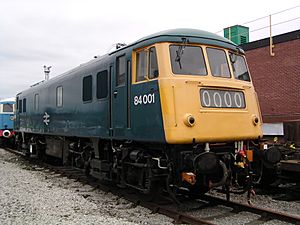British Rail Class 84 facts for kids
Quick facts for kids British Railways AL4British Rail Class 84 |
|
 |
|
| Preserved locomotive 84001 on display at Crewe Works open day on 11 September 2005. | |
| Power type | Electric |
|---|---|
| Builder | North British Locomotive Company |
| Build date | 1960–1961 |
| Total production | 10 |
| Configuration | Bo-Bo |
| UIC classification | Bo'Bo' |
| Gauge | 4 ft 8 1⁄2 in (1,435 mm) |
| Wheel diameter | 4 ft 0 in (1.219 m) |
| Length | 57 ft 6 in (17.53 m) |
| Locomotive weight | 76.60 long tons (77.83 t) |
| Electric system(s) | 25 kV AC |
| Traction motors | 750 hp (560 kW) GEC WT501, 4 off |
| Top speed | 100 mph (160 km/h) |
| Power output | 3,100 hp (2,300 kW) |
| Tractive effort | 50,000 lbf (220 kN) |
| Train heating | Electric Train Heating |
| Locomotive brakeforce | 65.5 long tons-force (653 kN) |
| Train brakes | Vacuum; Dual from 1972 |
| Career | British Rail |
| Number | E3036–E3045; later 84001–84010 |
| Axle load class | Route availability 6 |
| Retired | 1979–1980 |
| Disposition | One preserved, remainder scrapped |
The British Rail Class 84 was a type of electric train engine. These powerful locomotives ran on the West Coast Main Line in the London Midland Region of Britain. They were designed to use a special 25,000-volt AC (alternating current) electricity system.
Contents
What is the Class 84 Locomotive?
The Class 84 was an important electric locomotive used by British Rail. It was part of a plan to make train travel faster and more modern. These engines were built to pull passenger and freight trains. They helped connect major cities like London and Glasgow.
Building the Electric Engines
Only ten Class 84 locomotives were ever built. They were constructed between 1960 and 1961. The North British Locomotive Company built these engines. They were given numbers from E3036 to E3045. Later, their numbers changed to 84001 to 84010.
How the Class 84 Worked
These locomotives were electric, meaning they got their power from overhead wires. They used a 25,000-volt AC system. This was a new and efficient way to power trains. Each engine had four powerful traction motors. These motors gave the locomotive a lot of strength.
Speed and Power of the Class 84
The Class 84 was built for speed. It could reach a top speed of 100 miles per hour (160 km/h). This made it one of the faster trains of its time. The engine had a power output of 3,100 horsepower. This was enough to pull long and heavy trains.
Braking System
Early Class 84 locomotives used a "vacuum" braking system. This system used air pressure to slow the train. From 1972, they were updated to a "dual" braking system. This gave them more reliable stopping power.
Life and Retirement of the Class 84
The Class 84 locomotives served British Rail for about two decades. They were a key part of the West Coast Main Line's electrification. This project made train journeys quicker and smoother.
When Were They Retired?
The Class 84 engines were retired from service between 1979 and 1980. This was because newer, more advanced locomotives were being introduced. Most of the Class 84s were scrapped after retirement.
The Last Surviving Class 84
Only one Class 84 locomotive remains today. This engine, numbered 84001, has been preserved. It is a reminder of British railway history. You can sometimes see it on display at special events.
Images for kids
 | Janet Taylor Pickett |
 | Synthia Saint James |
 | Howardena Pindell |
 | Faith Ringgold |


